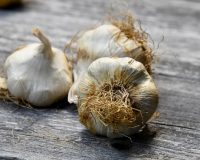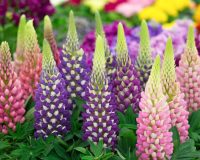If your pet has ingested a toxic substance:
• Remove your pet from the area
• Check to make sure your pet is safe: breathing and acting normally
• Do not give any home antidotes
• Do not induce vomiting
• Call the ASPCA’s Animal Poisoning hotline at 1-888-426-4435 (fees may apply)
• If veterinary attention is necessary, contact your veterinarian or emergency veterinary clinic immediately.
Common, visible signs of poisoning include:
• Hyper-salivation (drooling)
• Vomiting
• Diarrhea
• Lethargy
• Hiding (cats)
• Tremors/convulsions
• Increased respiration/panting
• Sudden and severe behavioural change
Common toxic plants in Canada
These plants are commonly found in Canada: wild-growing and in homes and gardens. For a more exhaustive list of more exotic plants, please see ASPCA’s website for their complete list of
Toxic and Non-Toxic Plants, affecting dogs, cats and horses (those which are non-toxic are further down the page).
Aconitum (250 varieties)
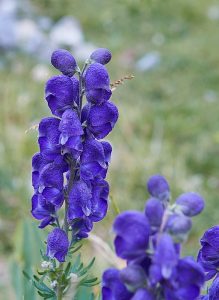
Symptoms include: diarrhea, convulsions, ventricular arrhythmia and death. Aconitum, also known as aconite, monkshood, wolf’s-bane, leopard’s bane, mousebane, women’s bane, devil’s helmet, queen of poisons, or blue rocket, is a genus of over 250 species of flowering plants belonging to the family Ranunculaceae. These herbaceous perennial plants are chiefly native to the mountainous parts of the Northern Hemisphere, growing in the moisture-retentive but well-draining soils of mountain meadows. Most species are extremely poisonous and must be dealt with very carefully. Several Aconitum hybrids, such as the Arendsii form of Aconitum carmichaelii, have won gardening awards — such as the Royal Horticultural Society’s Award of Garden Merit. Some are used by florists. (source: Wikipedia)
Allium Cepa (onion)
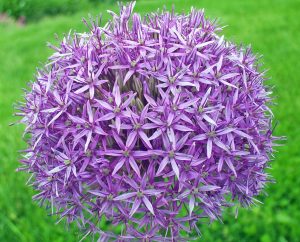
Symptoms include: vomiting, breakdown of red blood cells (hemolytic anemia, Heinz body anemia), blood in urine, weakness, high heart rate, panting.
Aloe Vera (outer leaves)
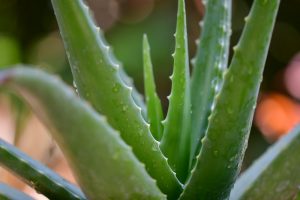
Symptoms include: vomiting, lethargy, diarrhea. The gel is considered edible.
Amaryllis
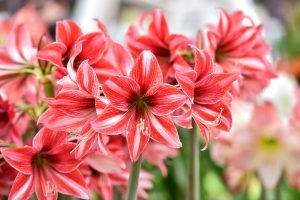
Symptoms include: vomiting, depression, diarrhea, abdominal pain, hyper-salivation, anorexia, tremors.
Asparagus fern
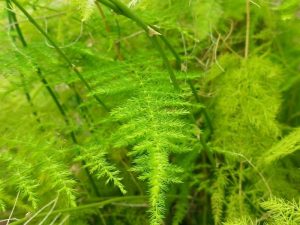
Symptoms include: allergic dermatitis with repeated dermal exposure. Berry ingestion could result in gastric upset (vomiting, abdominal pain, or diarrhea).
Autumn Crocus
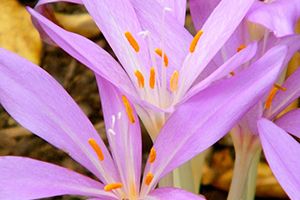
Symptoms include: bloody vomiting, diarrhea, shock, multi-organ damage, bone marrow suppression.
Azalea

Symptoms include: vomiting, diarrhea, weakness, cardiac failure.
Begonia
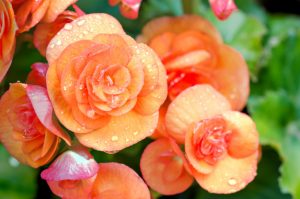
Symptoms include: kidney failure (in grazing animals), vomiting, salivation in dogs and cats. Most toxic part is the root.
Bird of Paradise (various)
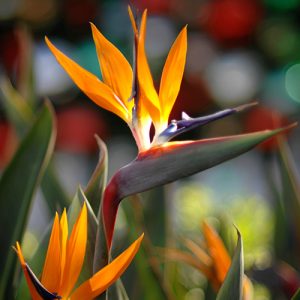
Bird of Paradise (strelitzia reginae). Symptoms include: mild nausea, vomiting, drowsiness; caused mainly by fruit and seeds.
More severe reactions are found in other Bird of Paradise varieties: Peacock Flower, Barbados Pride, Poinciana, Pride of Barbados.
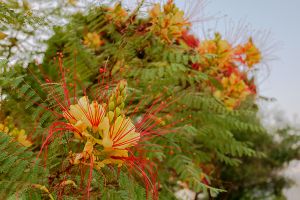
Bird of Paradise (Caesalpinia gilliesii). Symptoms include: oral irritation, intense burning and irritation of mouth, tongue and lips, excessive drooling, vomiting, diarrhea, difficulty swallowing and incoordination is possible in dogs and cats. Deaths in rabbits have been reported.
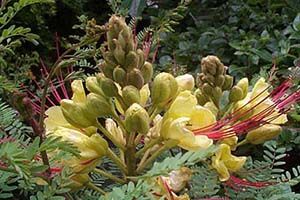
Bird of Paradise (Poinciana gilliesii). Symptoms include: Oral irritation, intense burning and irritation of mouth, tongue and lips, excessive drooling, vomiting, diarrhea, difficulty swallowing and incoordination is possible in dogs and cats. Deaths in rabbits have been reported.
Bluebell
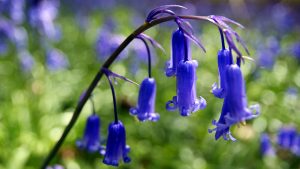
Symptoms include: diarrhea, vomiting and abdominal problems, heart function can be affected, depending on the amount consumed.
Buttercup
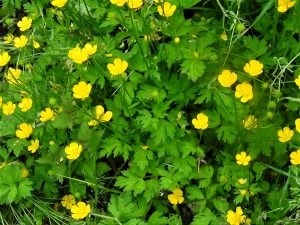
Symptoms include: vomiting, diarrhea, depression, anorexia, hypersalivation, oral ulcers and wobbly gait.
Castor Bean Plant
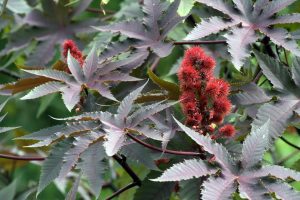
Beans are very toxic: oral irritation, burning of mouth and throat, increase in thirst, vomiting, diarrhea, kidney failure, convulsions. Access to ornamental plants or pruned foliage most common in poisonings. Ricin is a highly toxic component that inhibits protein synthesis; ingestion of as little as one ounce of seeds can be lethal. Signs typically develop 12 to 48 hours after ingestion, and include loss of appetite, excessive thirst, weakness, colic, trembling, sweating, loss of coordination, difficulty breathing, progressive central nervous system depression, and fever. As syndrome progresses, bloody diarrhea may occur, and convulsions and coma can precede death.
Cherry and Choke Cherry
Information and Symptoms: Stems, leaves, seeds contain cyanide, particularly toxic in the process of wilting. Brick-red mucous membranes, dilated pupils, difficulty breathing, panting, shock.

Cherry
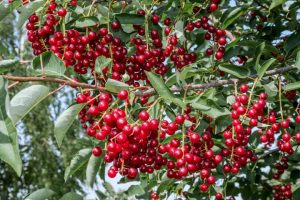
Choke Cherry
Chives
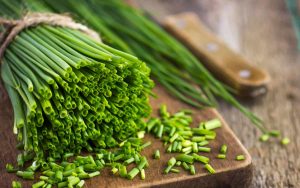
Symptoms include vomiting, breakdown of red blood cells (hemolytic anemia, Heinz body anemia), blood in urine, weakness, high heart rate, panting.
Clematis
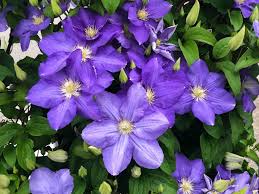
Symptoms include: salivation, vomiting, diarrhea.
Cyclamen
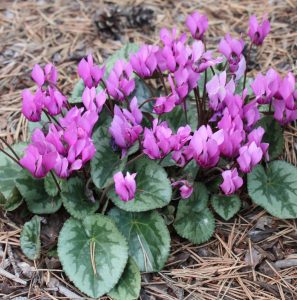
Symptoms include: Salivation, vomiting, diarrhea. Following large ingestions of tubers, heart rhythm abnormalities, seizures, death. Tubers (source: Wikipedia): Tubers are enlarged structures in some plant species used as storage organs for nutrients. They are used for the plant’s perennation (survival of the winter or dry months), to provide energy and nutrients for regrowth during the next growing season, and as a means of asexual reproduction. Stem tubers form thickened rhizomes (underground stems) or stolons (horizontal connections between organisms). Common plant species with stem tubers include potato and yam. Some sources also treat modified lateral roots (root tubers) under the definition; these are found in sweet potatoes, cassava, and dahlias.
Daffodil (bulbs)

Bulbs are toxic. Symptoms include: vomiting, salvation, diarrhea; large ingestions cause convulsions, low blood pressure, tremors and cardiac arrhythmias.
Daisy

Symptoms include: vomiting, diarrhea, hypersalivation, incoordination, dermatitis.
Delphinium (aka Larkspur)

The alkaloids in the plant cause neuromuscular paralysis; clinical effects include constipation, colic, increased salivation, muscle tremors, stiffness, weakness, recumbency, and convulsions. Cardiac failure may occur, as can death from respiratory paralysis.
Foxglove
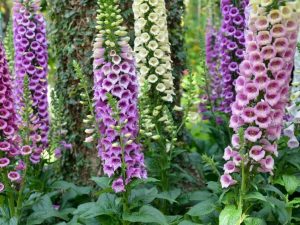
Symptoms include: cardiac arrhythmias, vomiting, diarrhea, weakness, cardiac failure, death.
Garlic
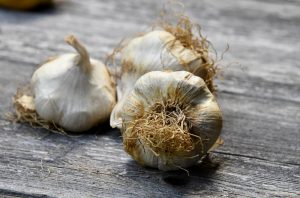
Symptoms include: vomiting, breakdown of red blood cells (hemolytic anemia, Heinz body anemia), blood in urine, weakness, high heart rate, panting.
Hemlock
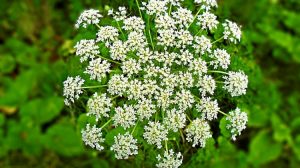
Affects nerve impulse transmission to muscles, leading to respiratory failure. Toxic to humans and animals. Natural pollination is occurring and this poisonous plant is increasingly prevalent in nature and gardens in North America.
Hyacinth
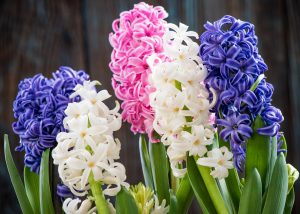
Symptoms include: vomiting, diarrhea, dermatitis and allergic reactions. Bulbs contain highest amount of toxin.
Hydrangea
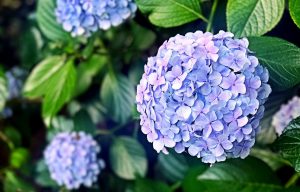
Symptoms include: vomiting, depression, diarrhea. Cyanide intoxication is rare – usually produces more of a gastrointestinal disturbance.
Ivy (various)
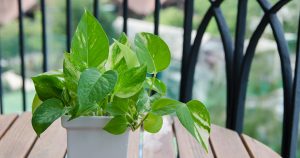
Ivy Arum. Symptoms include: Oral irritation, intense burning and irritation of mouth, tongue and lips, excessive drooling, vomiting, difficulty swallowing.
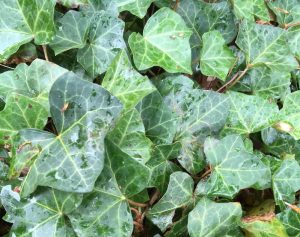
English Ivy, Glacier Ivy, Needlepoint Ivy, Sweetheart Ivy, California Ivy. Symptoms include: vomiting, abdominal pain, hyper-salivation, diarrhea. Foliage is more toxic than berries. (English Ivy is pictured.)
Leek
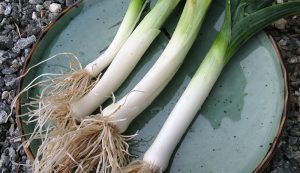
Symptoms incude: vomiting, breakdown of red blood cells (hemolytic anemia, Heinz body anemia), blood in urine, weakness, high heart rate, panting.
Lily family
Symptoms include (calla, easter, peace lily varieties): gastrointestinal upset, depression, anorexia, tremors. Day Lilies are not toxic.
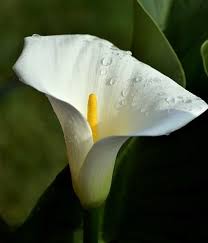
Calla Lily
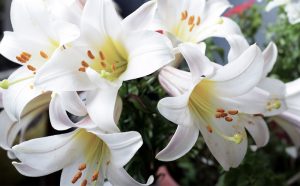
Easter Lily
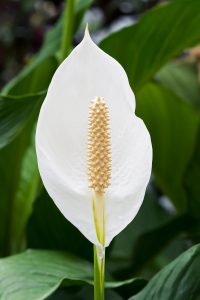
Peace Lily
Lily of the Valley
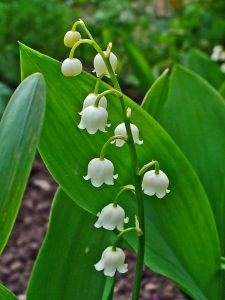
Symptoms include: vomiting, irregular heart beat, low blood pressure, disorientation, coma, seizures.
Lupin
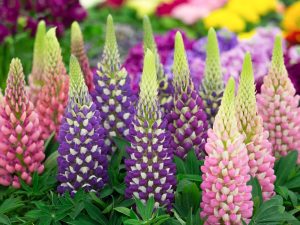
Large ingestion of stalk, pods and/or seeds produce loss of coordination and appetite, frothing, difficulty breathing, lethargy, twitching, convulsions, jaundice, respiratory paralysis, death. Younger plants are more toxic.
Marijuana
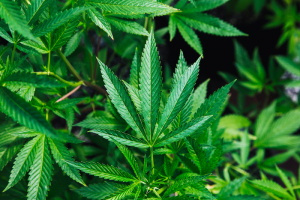
Symptoms include: prolonged depression, vomiting, incoordination, sleepiness or excitation, hypersalivaton, dilated pupils, low blood pressure, low body temperature, seizure, coma, death (rare).
Milkweed
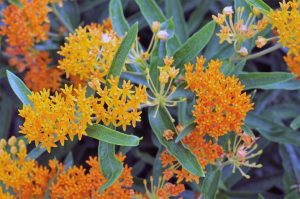
Milkweed (asclepias species).
Symptoms include: vomiting, profound depression, weakness, anorexia, and diarrhea are common; may be followed by seizures, difficulty breathing, rapid, weak pulse, dilated pupils, kidney or liver failure, coma, respiratory paralysis and death.
Mistletoe (American)
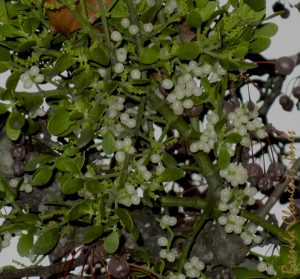
Symptoms include: vomiting, diarrhea, low blood pressure (rare), difficulty breathing, low heart rate
Morning Glory
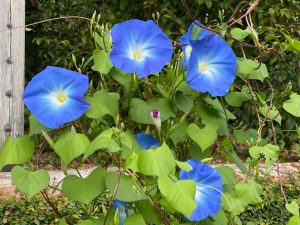
Symptoms include: vomiting, large amounts of seeds may cause hallucinations
Nightshade (Solanum spp)
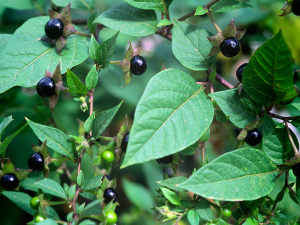
Symptoms include: hyper-salivation, loss of appetite, severe gastrointestinal upset, diarrhea, drowsiness, central nervous system depression, confusion, behavioral change, weakness, dilated pupils, slow heart rate.
Oleander
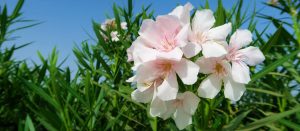
Symptoms include: drooling, abdominal pain, diarrhea, colic, depression, death.
Palm (Sago variety)
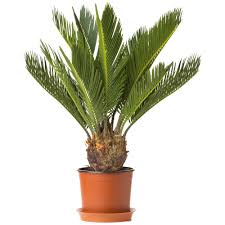
Symptoms include: vomiting, melena, icterus, increased thirst, hemorrhagic gastroenteritis, bruising, coagulopathy, liver damage, liver failure, death.
Poinsettia
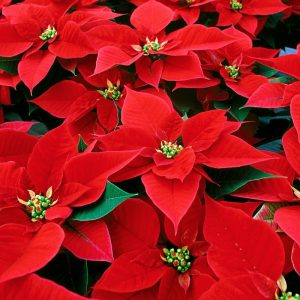
Symptoms include: Irritating to the mouth and stomach, sometimes causing vomiting, but generally over-rated in toxicity.
Portulaca
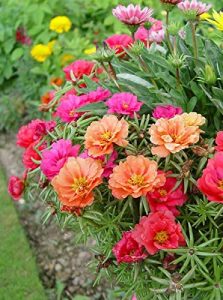
Symptoms include: muscle weakness, depression, diarrhea.
Rhododendron
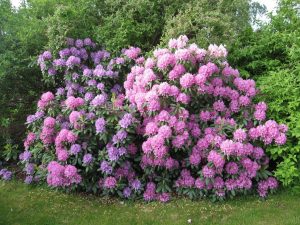
Symptoms include: vomiting, diarrhea, hypersalivation, weakness, coma, hypotension, central nervous system depression, cardiovascular collapse and death. Ingestion of a few leaves can cause serious problems. Rhododendron is typically not very palatable to horses unless it is the only forage available, but sheep and goats may graze readily on the plant. The toxic principle interferes with normal skeletal muscle, cardiac muscle and nerve function. Clinical effects typically occur within a few hours after ingestion, and can include acute digestive upset, excessive drooling, loss of appetite, frequent bowel movements/diarrhea, colic, depression, weakness, loss of coordination, stupor, leg paralysis, weak heart rate and recumbency for 2 or more days; at this point, improvement may be seen or the animal may become comatose and die.
Rhubarb (leaves)
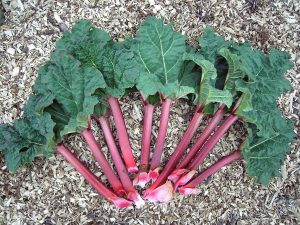
Symptoms include: drooling, tremors, kidney failure.
Sweet Pea
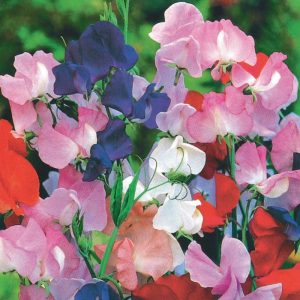
Symptoms include: weakness, lethargy, pacing, head pressing, tremors, seizures and possibly death.
Tomato Plant (leaves, stem)

Symptoms of ingesting leaves or stem include: hyper-salivation, loss of appetite, severe gastrointestinal upset, depression, weakness, dilated pupils, slow heart rate. Tomato itself is non-toxic.
Tulip bulb

Symptoms include: vomiting, depression, diarrhea, hypersalivation. Highest concentration of toxin in bulb.
Wax Leaf
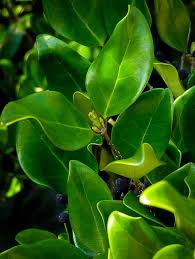
Symptoms include: gastrointestinal upset (most common), incoordination, increased heart rate, death (rare).
Wisteria
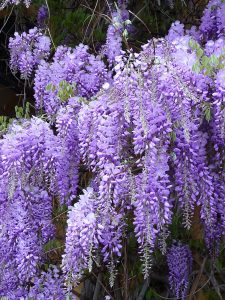
Symptoms include: vomiting (sometimes with blood), diarrhea, depression.
Yew, Japanese Yew
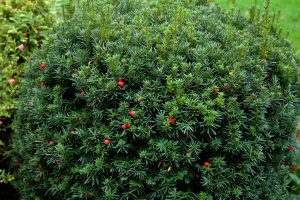
Symptoms include: sudden death from acute cardiac failure, early signs — muscular tremors, dyspnea, seizures in dogs.
Sources: ASPCA, The Kennel Club











